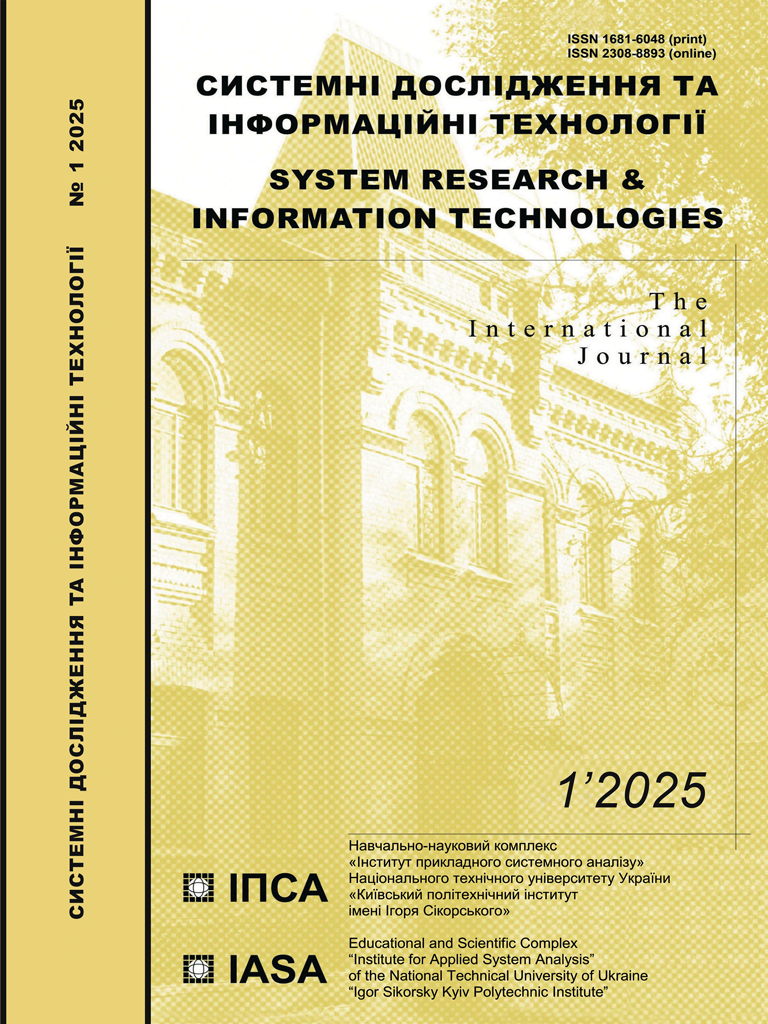Investigation of the effectiveness of artificial neural networks of different generations in the task of forecasting in the financial sphere
DOI:
https://doi.org/10.20535/SRIT.2308-8893.2025.1.09Keywords:
generations of ANNs, Back Propagation, LSTM, GMDH neo fuzzy, HSCI baggingAbstract
This paper discusses ANNs of different generations. The efficiency of using computational intelligence in the task of short- and medium-term forecasting in the financial sphere is investigated. For the investigation, a fully connected feed-forward network (Back Propagation), a recurrent network (LSTM), a hybrid deep learning network based on self-organization (GMDH neo fuzzy), and a hybrid system of computational intelligence based on bagging and group method of data handling (HSCI bagging) were chosen. The experimental parameters chosen are the prediction interval, the number of inputs, the percentage of validation data in the training set, and the number of fuzzifiers (for GMDH neo-fuzzy). Experiments were conducted, and the best results for different prediction intervals were compared. The optimal parameters of the networks and the feasibility of their use in the task of forecasting at different intervals are determined.
References
Frank Rosenblatt, “The Perceptron: A Probabilistic Model for Information Storage and Organization in the Brain,” Psychological Review, vol. 65, no. 6, pp. 386–408, 1958.
David E. Rumelhart, Geoffrey E. Hinton, and Ronald J. Williams, “Learning representations by back-propagating errors,” Nature, vol. 323, pp. 533–536, 1986. doi: 10.1038/323533a0
G.V. Cybenko, “Approximation by Superpositions of a Sigmoidal function,” Mathematics of Control, Signals and Systems, vol. 2, no. 4, pp. 303–314, 1989, doi: 10.1007/BF02551274
I. Goodfellow, Y. Bengio, and A. Courville, Deep Learning. MIT Press, 2016. Available: http://www.deeplearningbook.org
A.G. Ivakhnenko, V.G. Lapa, Cybernetic forecasting devices (in Ukrainian). K.: Naukova Dumka, 1965, 216 p.
A.G. Ivakhnenko, G.A. Ivakhnenko, and J.A. Mueller, “Self-organization of the neural networks with active neurons,” Pattern Recognition and Image Analysis, vol. 4, no. 2, pp. 177–188, 1994.
Jürgen Schmidhuber, “Deep learning in neural networks: An overview,” Neural Networks, pp. 85–117, 2015. doi: 10.1016/j.neunet.2014.09.003
Purwono Purwono et al., “Understanding of Convolutional Neural Network (CNN): A Review,” International Journal of Robotics and Control Systems, vol. 2, no. 4, pp. 739–748, 2023. doi: 10.31763/ijrcs.v2i4.888
B. Hammer, “On the approximation capability of recurrent neural networks,” Neurocomputing, vol. 31, pp. 107–123, 1998. doi: 10.1016/S0925-2312(99)00174-5
S. Hochreiter, J. Schmidhuber, “Long short-term memory,” Neural Computation, vol. 9, pp. 1735–1780, 1997. doi: 10.1162/neco.1997.9.8.1735
C. Olah, Understanding LSTM networks. 2020. Available: https://colah.github.io/posts/2015-08-Understanding-LSTMs
Yu. Zaychenko, Galib Hamidov, “The Hybrid Deep Learning GMDH-neo-fuzzy Neural Network and Its Applications,” Proceedings of 13-th IEEE International Conference Application of Information and Communication Technologies-AICT2019. 23–25 October 2019, Baku, pp. 72–77. doi: 10.1109/AICT47866.2019.8981725
Evgeniy Bodyanskiy, Yuriy Zaychenko, Olena Boiko, Galib Hamidov, and Anna Zelikman, “Structure Optimization and Investigations of Hybrid GMDH-Neo-fuzzy Neural Networks in Forecasting Problems,” System Analysis & Intelligent Computing; Eds. Michael Zgurovsky, Natalia Pankratova. Book Studies in Computational Intelligence, SCI, vol. 1022. Springer, 2022, pp. 209–228.
T. Yamakawa, E. Uchino, T. Miki, and H. Kusanagi, “A neo-fuzzy neuron and its applications to system identification and prediction of the system behavior,” Proc. 2nd Intern. Conf. Fuzzy Logic and Neural Networks “LIZUKA-92”, Lizuka, 1992, pp. 477–483.
Ye. Bodyanskiy, O. Kuzmenko, He. Zaichenko, and Yu. Zaychenko, “Hybrid System of Computational Intelligence based on Bagging and Group Method of Data Handling,” System Research and Information Technologies, no. 1, pp. 75–85, 2024. doi: 10.20535/SRIT.2308-8893.2024.1.06
“DJIA - Dow Jones Industrial Average Historical Prices,” WSJ. Accessed on: August 1, 2024. [Online]. Available: https://www.wsj.com/market-data/quotes/index/DJIA/historical-prices

